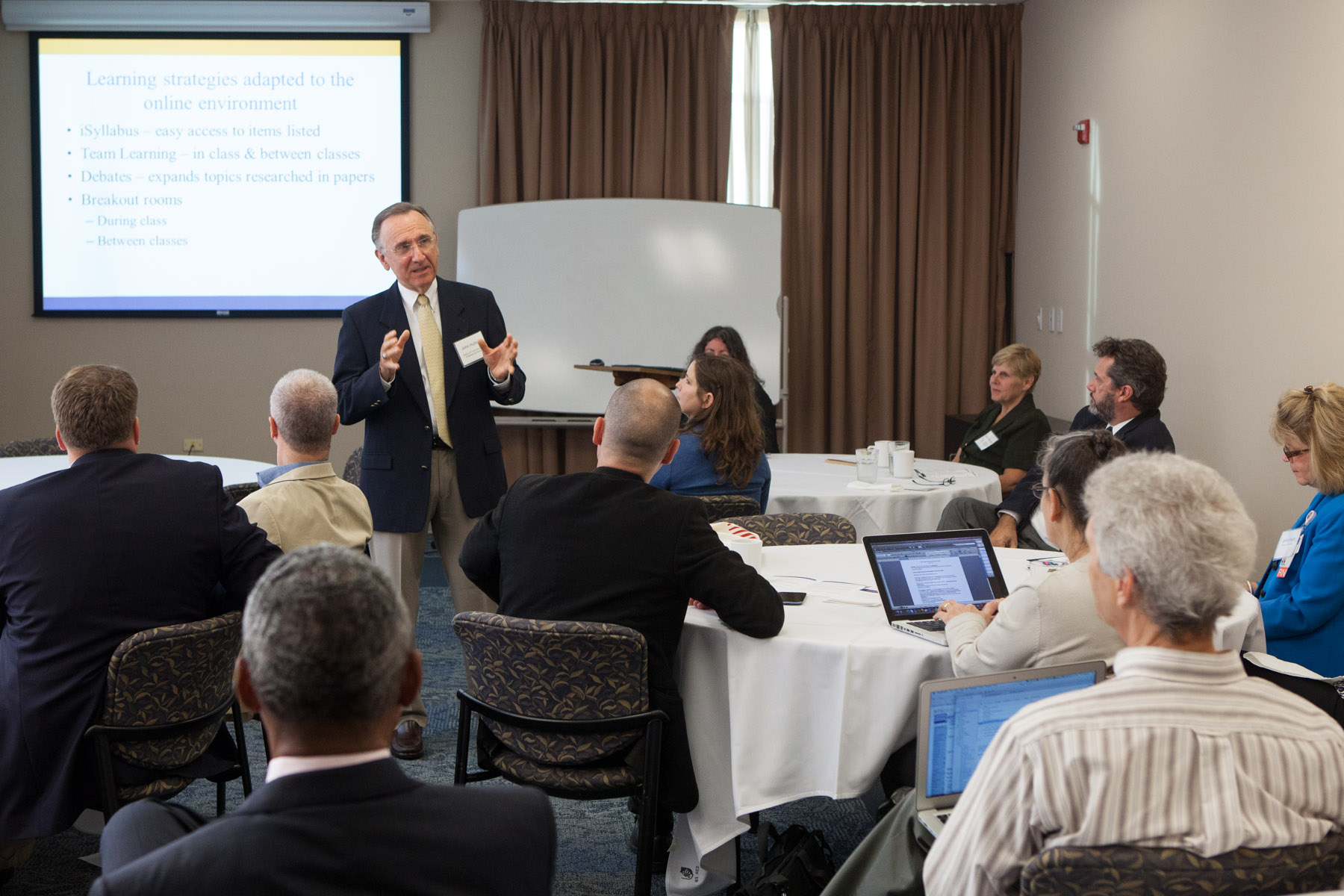University of Virginia professors from across Grounds who have used technology to enhance their teaching will share best practices and lessons learned through a new two-part course on Technology-Enhanced Learning for their U.Va. colleagues. Part one starts Nov. 9.
The course, offered by U.Va.’s School of Continuing and Professional Studies, will help University faculty incorporate technology into their own course design and instruction, guided by advice from some of U.Va.’s “technology-enhanced learning all-stars,” said Gail Hunger, the school’s director of instructional quality.
Among those all-stars is School of Engineering and Applied Science associate dean Ed Berger. Since 2006, he has used Web 2.0 tools in his teaching to facilitate student collaboration and team learning – things like a class blog, student video projects and “problem solution video mashups,” where a video of Berger working through an engineering problem is interspersed with student discussions of problem-solving tips.
Another guest speaker, David F. Feldon, associate director of the Curry School of Education’s Center for the Advanced Study of Teaching and Learning in Higher Education, has co-written several studies of the effectiveness of distance-learning technologies and a chapter in “The Cambridge Handbook of Multimedia Learning” titled, “Five Common But Questionable Principles Of Multimedia Learning.”
The course leaders will explain how they have implemented technology in their teaching, including using social media; online interactive assessments; video recording for course introductions, lectures and guest lecturers or lab-based instruction; engaging students in live online meetings; and using the iRubric tool to assess assignments and online course discussions, Hunger said.
Online learning, including supplements to traditional classes, has its own demands and rewards, and when done right is more complex than simply putting lectures online, said guest speaker Emily Drake, an associate professor of nursing who has been engaged for several years in the School of Nursing’s federally funded, online-based master's and doctoral programs to increase graduate-level training for nurses in rural and underserved areas.
The first course, “Introduction to Technology-Enhanced Learning,” running from Nov. 9 to Feb. 8, will provide an overview of course organization, instructional ideas and the ever-increasing digital tools available in UVaCollab.
The second course, “TEL Applied Course Development & Design,” running from Feb. 22 to May 17, will develop a specific plan for each participating faculty member to incorporate technology-enhanced learning into course design and instruction. There will be small- and large-group collaborative discussions, both on Grounds and online.
Both courses will be presented in a hybrid format, with some elements online and some in person, giving faculty an opportunity to experience an online course from the learner’s perspective, Hunger said. “You do have to experience online learning to appreciate it.”
Benefits-eligible faculty may use their annual $2,000 education benefit to pay for these noncredit courses, priced at $1,195 apiece. Registration is open until the start date of each class. (Full details here.)
Those who complete the series will be invited to present their new course designs and findings at U.Va.’s Teaching with Technology Conference in August.
Throughout the program, experts on U.Va. technology tools from the University’s Information Technology Services, the Office of Institutional Assessment and the Library will be available for group discussion and individual consultations.
Hunger said the class will build on lessons learned over the past year through a School of Continuing and Professional Studies technology-enhanced learning grant program led by Hunger that provided funding and guidance to eight of the school’s faculty members to help them integrate meaningful uses of technology into existing or new courses.
Several of those faculty members will share lessons learned. For instance, John Hulburt will explain how he has made his financial-management course 100 percent online, and his finding that student breakout groups “work better online than in person.”
Laura Frey Horn, who teaches a “Transformative Leadership” course, will explain how online video link technology enables eminent guest speakers from around the world to address her class. For instance, management consultant and former University of North Texas faculty member Don Beck has spoken to her class about his 62 secret visits to South Africa in the 1980s and 1990s to meet with Nelson Mandela and then-president of South Africa F.W. de Klerk to lay the groundwork to end apartheid.
Technology-enhanced learning is “not supplanting, but complementing what U.Va. already does,” said Billy Cannaday, dean of the School of Continuing and Professional Studies and vice provost for academic outreach. “There are no plans to homogenize U.Va.’s TEL efforts. That doesn’t work at U.Va. The small bets and larger trials are just beginning.”
Media Contact
Article Information
October 25, 2012
/content/scps-offers-new-class-uva-faculty-technology-enhanced-learning-techniques

